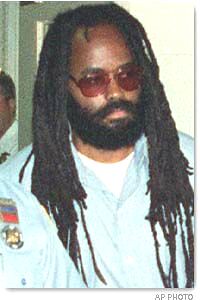
Mumia Abu-Jamal Has Filed New Legal Papers on Constitutional Violations, a photo by Pan-African News Wire Photo File on Flickr.
For a Revolutionary Black History Month
[col. writ. 1/21/12] (c) '12 M. A. Jamal
As we once again approach February, the papers and TV stations will feature programming that shows more Black faces than usual. Some will show movies, some documentaries and some will feature history in celebration of Black History Month.
Undoubtedly, Martin Luther King Jr's epic "March on Washington" speech will be samples, its grainy, black and white videotape the very symbol of a bygone era, and it's key catchphrase....Thank God Almighty, we're free at last!" ~ a haunting and ironic mockery of the real state of most of Black America.
One tape that invariably will not be shown is one of the final press conferences of the nation's first (and perhaps only) Black U.S. Supreme Court Justice, Thurgood Marshall, aged and ill, yet with the presence of mind to announce, "I'm still not free."
For millions of Black Americans, this Black History Month, while perhaps rich in symbol, comes amidst the greatest loss of collective assets in our history, crippling joblessness, haunting home foreclosures, public schools that perform more mis-education than education, rabid police terrorism and perhaps the highest Black incarceration rates in U.S. history, and all that entails.
That we have Black History Month at all is due to the Black Freedom Movements of the '60's, and the dogged persistence of Black Historian, Carter G. Woodson, who began his efforts with Negro History Week, back in the 1920's! Yet, it begins, as do all struggles for progress, with the Movement.
If Black mothers and grandmothers, and later Black schoolchildren, didn't follow King, we wouldn't know his name, except perhaps as an Historical footnote. For, without followers, there is no movement - and thus no progress.
The late, great Marxist Revolutionary historian, C.L.R. James, in his finest work, Black Jacobins, a History of the Haitian Revolution, illustrates how the leadership - including Gen. Toussaint L'Ouverture - tried repeatedly to betray the Revolution, on to face two immovable forces -the racist recalcitrance of the French government of Napoleon (who wanted to restore slavery), and the militancy of the Black soldiers, who pushed onward to Revolution.
The point? People make history, by mass movements, often ones which go faster and further than the leaders want. And masses make and sustain revolutions - often against 'leaders' whose every instinct is to betray them.
In a forward to one of the many editions of Black Jacobins, James reminds us, "...that it was the slaves who had made the Revolution. Many of the slave leaders to the end were unable to read or write" (James, xvi)
But they sure knew how to fight.
Africans, by the tens of thousands, broke their chains, and though penniless, hungry, and scarred by the ravages of bondage, found weapons and the will to fight for freedom against the defenders of slavery: France, Britain, and Spain. They beat them all, because their hunger for freedom was greater than anything.
ANYTHING.
And by so doing they changed world history.
They shattered French dreams of an American Empire; and enabled the U.S. to double in size after it's purchase of Louisiana from Napoleon.
They also did what no 'slave' army had ever done in modern or ancient history. They defeated an empire.
That is Revolutionary Black History ---and it deserves to be remembered during Black History Month.
(c) '12 maj
==============
The Power of Truth is Final -- Free Mumia!
Mumia Abu-Jamal's Radio Essays - Subscribe at the website or on iTunes and get Mumia's radio commentaries online.
Audio of most of Mumia's essays are at: http://www.prisonradio.org
Mumia's got a podcast! http://mumiapodcast. libsyn.com/
Get your copy of the new book by Mumia and Marc Lamont Hill "The Classroom and The Cell: Conversations on Black Life in America"
at
http://twpbooks.com/catalog/ theclassroomandthecell-p-208. html
No comments:
Post a Comment